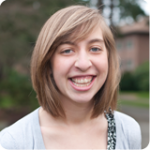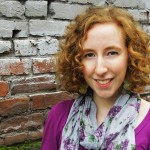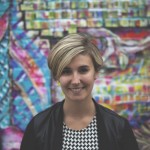The Center for Media and Social Impact selected six graduate fellows to attend the Full Frame Documentary Film Festival in Durham, NC, led by American University SOC Professor Maggie Stogner. The fellows participated in a curated fellows program along with 180 other students from universities nationwide. The program included a screening of Cameraperson and a session with the renowned cinematographer/director, Kirsten Johnson, whose work was featured throughout the festival as part of Full Frame’s annual Tribute Award program. The fellows also saw the World Premiere of Raising Bertie and had a private panel with Director/Producer Margaret Byrne, DP/Producer Jon Stuyvesant, and Producer Ian Robertson Kibbe from Kartemquin Films. The program also included the opening night screening of Weiner, Presenting Princess Shaw and Two Trains Runnin’. The fellows share some of the highlights and insights they gained as a result of the festival.
 “The film that resounds most with me was Cameraperson, an elegant and profound examination of the experience of veteran cinematographer Kirsten Johnson. The film, in an almost avant-garde way, shows snippets of Kirsten’s work from various films she’s worked on over the years. Following only minimal narrative structure, the film is truly a filmmakers film. For me, the very personal lens and focus on why and how the camera captured moments was what every film student seeks. While the film did seem long and the format, at times, was emotionally taxing, I couldn’t keep my thoughts away from the film the entire weekend. This film, in ways that any finished product can not, showcased the immense curiosity and talent that goes into composing a visual story. I walked away from the film inspired in new ways and excited about the craft.”
“The film that resounds most with me was Cameraperson, an elegant and profound examination of the experience of veteran cinematographer Kirsten Johnson. The film, in an almost avant-garde way, shows snippets of Kirsten’s work from various films she’s worked on over the years. Following only minimal narrative structure, the film is truly a filmmakers film. For me, the very personal lens and focus on why and how the camera captured moments was what every film student seeks. While the film did seem long and the format, at times, was emotionally taxing, I couldn’t keep my thoughts away from the film the entire weekend. This film, in ways that any finished product can not, showcased the immense curiosity and talent that goes into composing a visual story. I walked away from the film inspired in new ways and excited about the craft.”
— Elizabeth Herzfeldt-Kamprath, MFA Film & Electronic Media ’18
 “During the fellows workshop featuring the prominent documentarian Kirsten Johnson, one of her most intriguing comments was about the use of social media with documentary films. Social media outreach is often considered essential for creating documentaries, and the use of social media for the film can start as early as during production or even development. However, she commented that it’s important to let the story “become” before telling the world about it. I tend to agree with her, as I believe one of the ‘magical’ parts of documentary filmmaking is the spontaneity and evolution of the story over time, which often even continues to change throughout the edit. If you present your story too soon to your audience, your obligations to the story and the audience can potentially conflict and become strained if audience expectations are not met or if you as the filmmaker feel locked into a story. The beauty of documentary filmmaking is how it allows for sincere discovery and lets a story unravel throughout the filmmaking process.”
“During the fellows workshop featuring the prominent documentarian Kirsten Johnson, one of her most intriguing comments was about the use of social media with documentary films. Social media outreach is often considered essential for creating documentaries, and the use of social media for the film can start as early as during production or even development. However, she commented that it’s important to let the story “become” before telling the world about it. I tend to agree with her, as I believe one of the ‘magical’ parts of documentary filmmaking is the spontaneity and evolution of the story over time, which often even continues to change throughout the edit. If you present your story too soon to your audience, your obligations to the story and the audience can potentially conflict and become strained if audience expectations are not met or if you as the filmmaker feel locked into a story. The beauty of documentary filmmaking is how it allows for sincere discovery and lets a story unravel throughout the filmmaking process.”
— Emma Kouguell, MFA Film & Electronic Media ’16
 “As a native of Durham, North Carolina for 16 years, one of my favorite parts of the 2016 Full Frame Documentary Film Festival was how well it incorporated into the culture of its host city. Durham has built much of its impressive growth over the last decade on the foodie movement, and this was evident in the festival’s healthy (often vegetarian) catered lunches, eclectic local beer during the opening night party, and southern-style awards barbecue on the final day. Durham has also worked hard to preserve the physical spaces of its past, and the festival’s venues included the town’s oldest theater, a refurbished armory, and a hotel that was once an ornate bank. The festival staff and volunteers also embodied the southern hospitality, combined with a healthy industriousness, that make the people of Durham her greatest asset. It was a wonderful festival that made me proud to hail from the Bull City.”
“As a native of Durham, North Carolina for 16 years, one of my favorite parts of the 2016 Full Frame Documentary Film Festival was how well it incorporated into the culture of its host city. Durham has built much of its impressive growth over the last decade on the foodie movement, and this was evident in the festival’s healthy (often vegetarian) catered lunches, eclectic local beer during the opening night party, and southern-style awards barbecue on the final day. Durham has also worked hard to preserve the physical spaces of its past, and the festival’s venues included the town’s oldest theater, a refurbished armory, and a hotel that was once an ornate bank. The festival staff and volunteers also embodied the southern hospitality, combined with a healthy industriousness, that make the people of Durham her greatest asset. It was a wonderful festival that made me proud to hail from the Bull City.”
— Sam Sheline, MFA Film & Electronic Media ’17
 “The most rewarding experience of the festival was the hour we spent listening to the dynamic, talented and inspiring Full Frame Tribute Award recipient, Kirsten Johnson. A lunch session designed for her to be prompted by an interviewer while sitting on chairs at the front of the room full of fellows, turned into an interactive dialogue as she walked around the room with the microphone, dishing out expert advice as students asked questions from a variety of topics from financial sustainability to types of cameras to children. The session was insightful, inspiring and full of excellent, professional advice that I personally felt lucky to hear from a veteran filmmaker such as Kirsten.”
“The most rewarding experience of the festival was the hour we spent listening to the dynamic, talented and inspiring Full Frame Tribute Award recipient, Kirsten Johnson. A lunch session designed for her to be prompted by an interviewer while sitting on chairs at the front of the room full of fellows, turned into an interactive dialogue as she walked around the room with the microphone, dishing out expert advice as students asked questions from a variety of topics from financial sustainability to types of cameras to children. The session was insightful, inspiring and full of excellent, professional advice that I personally felt lucky to hear from a veteran filmmaker such as Kirsten.”
— Sarah Dale, MFA Studio Art ’16
 “One of the toughest aspect of festival programming must be finding a good balance between light and dark. There are so many important issues that deserve attention but there is almost a feeling of fatigue or helplessness after viewing them all back-to-back in just a few short days. I think that’s why I was drawn to Presenting Princess Shaw. Despite all of the harsh realities she faced every day, the main subject still showed immense positivity and hope. It felt like a breath of fresh air. As filmmakers, we know just how important it is to know your audience and I applaud the organizers for knowing when attendees would need this film in the course of the festival.”
“One of the toughest aspect of festival programming must be finding a good balance between light and dark. There are so many important issues that deserve attention but there is almost a feeling of fatigue or helplessness after viewing them all back-to-back in just a few short days. I think that’s why I was drawn to Presenting Princess Shaw. Despite all of the harsh realities she faced every day, the main subject still showed immense positivity and hope. It felt like a breath of fresh air. As filmmakers, we know just how important it is to know your audience and I applaud the organizers for knowing when attendees would need this film in the course of the festival.”
— Paige Howarth, MFA Film & Electronic Media, ’17
